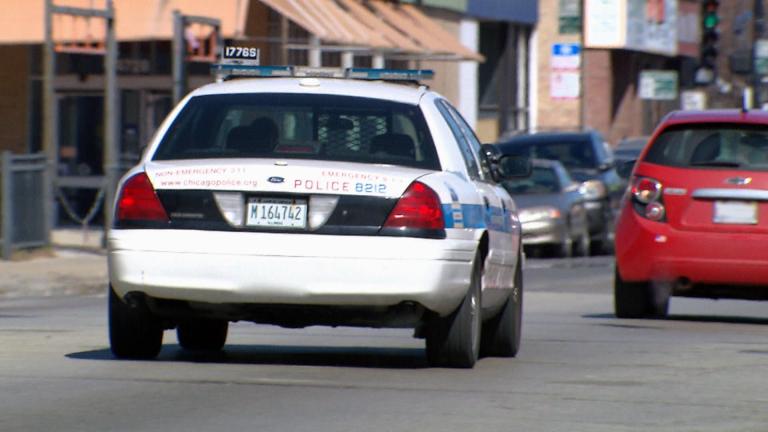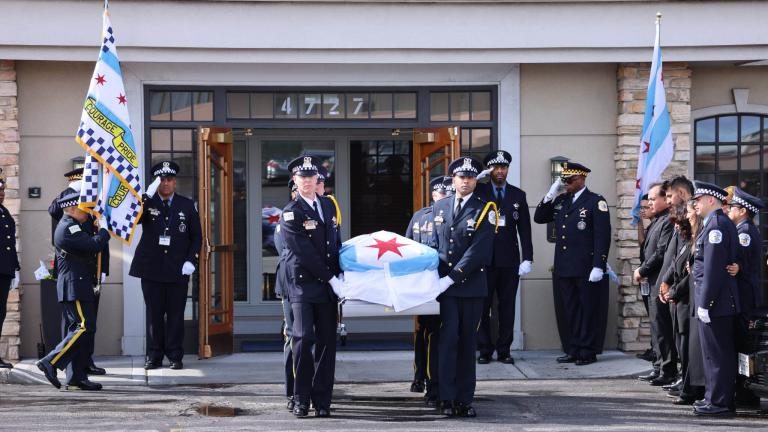Black Chicagoans were nine times more likely to be stopped by Chicago Police officers than White Chicagoans in 2018 and 2019, even though officers were 29% more likely to find drugs or weapons if they searched someone who is White, according to a report from the team overseeing court-ordered reforms of the Chicago Police Department.
In addition, Latino Chicagoans were three times more likely to be stopped by a police officer than White Chicagoans, according to the report, which examined approximately 300,000 stops and searches by Chicago Police officers during the two years before the COVID-19 pandemic upended policing in Chicago and across the nation and triggered a surge in crime that has yet to fully recede.
Both Black and Latino Chicagoans were more likely than White Chicagoans to be stopped and frisked, according to the report.
Officers are only permitted to conduct pat-down searches if they suspect criminal activity, according to the report. A search is more intrusive than a pat-down and requires probable cause or consent.
Chicago Police found drugs or weapons approximately 38% more often when they patted down a White Chicagoan as compared to a Latino Chicagoan, according to the report.
Officers rarely found drugs or weapons after stopping Chicagoans on the street, the report said.
Less than 4% of all searches resulted in the discovery of a weapon of any kind and just 3% yielded a gun, according to the report. After conducting a pat-down, officers found weapons in just 4.1% of the cases and guns in just 2% of the cases, the report said.
The 140-page report from the independent monitoring team, led by attorney Maggie Hickey, makes no conclusion as to whether Chicago Police officers were more likely to stop Black and Latino Chicagoans because of racial or ethnic bias. But it notes that Chicago Police Department leaders offered no “legitimate rationale” for the racial disparity.
“We do not know, for example, whether the differences in the CPD’s stop, pat-down, or search practices across Chicago reflect any intentional strategy to reduce any particular types of crimes — such as firearm or drug crime — or whether any differences reflect differences in local community feedback regarding the preferred strategy of local districts in the 2018-2020 time frame,” according to the report.
The alarm sounded by the independent monitoring team is the latest in a series of warnings that the Chicago Police Department has failed to significantly change the way it trains, supervises and disciplines officers in the more than six years since a federal investigation found officers routinely violated the constitutional rights of Black and Latino Chicagoans.
The results of the independent monitoring team replicate the findings of Chicago’s inspector general in an audit released in March 2022 that found that not only were Chicago Police were more likely to stop Black Chicagoans than White Chicagoans but also that officers were more likely to use force against Black Chicagoans.
Six weeks after Mayor Brandon Johnson took office, the city is in full compliance with 3% of the court order, known as a consent decree, that requires the Chicago Police Department to reform itself, according to data released by the Chicago Police Department.
The Police Department is sure to fall further behind once U.S. District Court Judge Rebecca Pallmeyer agrees, as expected, to expand the consent decree to include pedestrian and traffic stops by officers.
Johnson told reporters June 8 that he understands he faces a colossal challenge to fulfill his promise to restore the public’s trust in the beleaguered Police Department, which has faced decades of scandals, misconduct and brutality.
“I think everyone in this room knows what I have inherited,” Johnson said. “I don’t shy away from the responsibility. It is going to require a collaborative approach with law enforcement, with advocates and of course my administration to make sure that police officers are living up to their full responsibility of serving and protecting in an honorable way.”
Johnson’s remarks came in response to an audit by the inspector general released May 25 that found that more than 100 Chicago Police officers who lied while on the job were not fired, in violation of department rules and in defiance of decades of pledges from city officials who said they have zero tolerance for officers who make false reports.
Representatives of the Chicago Police Department and the mayor’s office did not respond to detailed questions from WTTW News about the report from the independent monitoring team about the department’s use of pedestrian stops and searches, instead providing a statement endorsing the change in oversight.
“These efforts to improve our these policies remain an important part of our overall reform efforts as we continue to build and maintain trust within the communities we serve,” a department spokesperson said.
The team’s next semiannual report, detailing the Police Department’s efforts to comply with the consent decree between July 1, 2022, and Dec. 31, 2022, is expected to be released soon.
The top job in the department’s Office of Constitutional Policing and Reform is now vacant, leaving no one in charge of the department’s reform efforts.
Former Executive Director Tina Skahill resigned on June 17 after than less than a year in the post. When she informed department leaders of her retirement, Skahill told them she was stepping down because of retaliation and invoked protections under the state’s whistleblower law.
Skahill replaced Bob Boik, who was fired by former Chicago Police Supt. David Brown in August, days after Boik warned that Brown’s decision to move 46 employees to patrol shifts would violate the consent decree.
Longstanding Concerns About ‘Stop-And-Frisk'
Pedestrian and traffic stops have been a flashpoint in the half-dozen serious efforts to reform the Chicago Police Department, since they put officers in close contact with Chicagoans, often under tense circumstances.
For decades, Chicago officers had to fill out a “contact card” every time they stopped a person but did not arrest them. Those cards were supposed to include the person’s age, address and race as well as the time and location of the stop and the reason for the stop.
If an officer has a reasonable suspicion that the person stopped is engaged in criminal activity, the officer can conduct what’s officially known as a protective pat-down but more often referred to as a stop-and-frisk.
The number of Chicagoans who were stopped and frisked by Chicago Police officers soared under former Police Supt. Garry McCarthy, hired by former Mayor Rahm Emanuel. In 2013, McCarthy defended the practice as a crucial tool in the fight against crime.
In the wake of the deaths of Michael Brown in Ferguson, Missouri, Tamir Rice in Cleveland, Ohio, and Eric Garner in New York at the hands of police, the American Civil Liberties Union of Illinois released a report in March 2015 that found officers stopped Black Chicagoans at a far higher rate than Latino or White Chicagoans.
Instead of suing Chicago, the ACLU reached an agreement with city officials in August 2015 requiring the Police Department to change its policies regarding stops, pat-downs and searches. Officers must now fill out investigatory stop reports, rather than contact cards, and document all stops as well as how often those stops result in pat-downs, the reason officers stopped that individual and whether the citizen gave permission for a pat-down or more intrusive search.
Those rules have been unchanged for nearly six years, records show.
Between 2016 and 2021, the number of pedestrian stops dropped approximately 37%, according to data from the Illinois Department of Transportation.
The number of pedestrian stops conducted by Chicago Police officers peaked in 2019, before dropping significantly after the COVID-19 pandemic hit, according to IDOT data.
The implementation of that agreement was complicated by the Police Department’s inability to collect data on each stop, how the officers were supervised and how the data on stops and pat-downs was later analyzed, according to the report from the independent monitoring team.
Delays were also caused by the COVID-19 pandemic, which shut down much of the federal court system for more than two years.
Court records show settlement negotiations are underway in a class-action lawsuit brought in 2015 by Chicagoans who alledge their constitutional rights were violated by the stops and searches.
Between 2014 and 2016, the number of pedestrian stops dropped by more than 85%, according to Chicago Police Department data.
“It is not an exaggeration to say that because of the ACLU agreement, hundreds of thousands of young Black men have avoided harassment and humiliation by Chicago police,” said Colleen Connell, the executive director of the ACLU of Illinois.
However, ACLU leaders are deeply frustrated that Chicago Police officers continue to disproportionately stop Black and Latino Chicagoans, Connell said.
“The data shows continuing, persistent racial and ethnic disparities in whom CPD officers stopped, frisked and searched,” Connell said. “The inevitable conclusion is that while the agreement has resulted in fewer pedestrian stops by CPD officers, residents of the city deserved more progress toward addressing the racial and ethnic disparities publicly reported by the ACLU in 2015.”
Connell welcomed the agreement to give the federal court the authority to oversee efforts to reform the way Chicago Police officers stop and search Chicagoans traveling by foot and by vehicle.
The independent monitoring team also raised serious concerns about the ability of supervisors to ensure officers were carrying out constitutional searches based on evidence, rather than racial profiling.
Department policy allows investigatory stop reports rejected for errors or incomplete information to be resubmitted to superiors an unlimited number of times, making it possible for numerous versions of the same report to exist and limiting officials’ ability to identify rule violations, according to the report.
In addition, the unit charged with auditing investigatory stop reports is unstaffed because of the staffing crunch facing the department, according to the report.
That has helped create a backlog of more than 25,000 investigatory stop reports waiting to be audited, the report said.
As Stop-And-Frisk Wanes, Traffic Stops Rise
Both the independent monitoring team and the ACLU of Illinois said there was evidence to suggest a direct correlation between a significant increase in the rate of reported traffic stops by police officers as the number of pedestrian stops dropped.
That prompted the monitoring team to recommend the department adopt “a single system to record investigatory stops and traffic stops, along with pat-downs and searches that take place during each type of stop,” according to the report.
Department leaders have yet to adopt that recommendation.
In 2019, before the pandemic hit but while the agreement with the ACLU was in effect, Chicago Police reported making more than 599,000 traffic stops to the Illinois Department of Transportation, a 600% increase from 2015.
Between 2019 and 2021, after the COVID-19 pandemic hit, the number of traffic stops made by Chicago Police dropped 45%, but has yet to return to levels last recorded in 2015, before pressure from the ACLU forced police officers to thoroughly document each pedestrian stop, pat-down and search.
Contact Heather Cherone: @HeatherCherone | (773) 569-1863 | [email protected]







